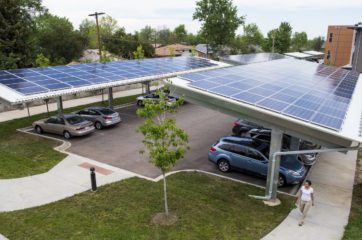“I do not believe in the Al Gore sciences,” Paul Lepage notoriously said in an interview during his 2010 Maine gubernatorial campaign. He went on to call for the abolition of the Department of Energy and the U.S. EPA, quickly positioning himself as a climate skeptic. For the subsequent eight years, Lepage served as Maine’s staunchly anti-environment governor, regularly vetoing environmental legislation, describing global warming as a scam, and halting significant climate progress in the state.
Not surprisingly, campaigns to put a price on carbon pollution in Maine have struggled to gain momentum. After all, even more standard bipartisan measures were sure to be defeated with a stroke of the Governor’s pen.
But the state’s environmentalists can look to the future with hope. After eight destructive years, Lepage is out of office, and in his place now is Democratic Governor Janet Mills, who has signaled that climate action is a top priority for her administration.
Mills, the state’s first female governor, spoke of the urgent need to move away from fossil fuels in her January 2nd inaugural address..
“Our new Administration will embrace clean energy; change our modes of transportation, weatherize homes and businesses, and reach a goal of 50 percent of our electricity coming from Maine renewable resources,” Mills said to an excited crowd at the Augusta Civic Center.
The change in rhetoric from the state’s executive branch has given lawmakers new opportunities to act on passing climate policy. Almost a decade after Lepage’s infamous remarks, a bill aiming to put a fee on carbon emissions has gained considerable support in the state legislature this year.
What does the bill look like?
“An Act to Price Pollution” (HP 343), introduced by Rep. Deane Rykerson (D), places an initial $5 per ton fee on carbon emissions. This fee is set to increase annually by $5, until capping off at $40 in 2028.
The bill exempts electric sector emissions from taxation, as utilities are already regulated by the emissions cap established by the Regional Greenhouse Gas Initiative (RRGI) in 2009.
All of the raised revenue would be collected by a Carbon Content Assessment Fund and rebated back to consumers “in an equitable way”, depending on their electricity usage. Climate activists hope some of the money consumers save through their lower utility bills might be used for home efficiency upgrades, and clean energy solutions such as rooftop solar.
Could the bill pass this year?
Momentum has been rapidly building for the groundbreaking legislation, which already boasts 80 co-sponsors. Furthermore, the political opportunity in the legislature is there since Democrats hold sizable majorities in both the Senate (21-14) and House (89-57).
“I think we have a very good chance of getting the bill implemented this session,” Rykerson said in an interview with Climate XChange. “We’ve been really behind with Lepage. And we have a lot of catching up to do.”
Dylan Vorhees, the climate and clean energy director for the Natural Resources Council of Maine (NRCM), told Climate XChange there are over 100 proposed pieces of legislation addressing climate or clean energy in some way this session.
“There’s a lot of enthusiasm and energy in the state of Maine on tackling climate change, for the first time in a long time,” Voorhees said. “And that’s very positive.”
Vorhees said that even if carbon pricing legislation doesn’t pass this session, there’s lots to be excited about.
“One of the things that we are especially looking forward to is Gov. Mills re-engaging in regional cooperation,” Vorhees said. “We have RGGI, but there are a lot of other ways that states are cooperating on climate policy, including carbon pricing, and it will be great to see Maine back on the table with dialogue and cooperation.”
“An Act to Price Pollution” has been referred to the Joint Committee on Energy, Utilities and Technology. A date for a committee hearing has not yet been set, but is expected for some time in late February.
If you want to stay informed on state carbon pricing campaigns across the country, sign up for the State Carbon Pricing Network Newsletter here and stay tuned for future Climate XChange updates.









